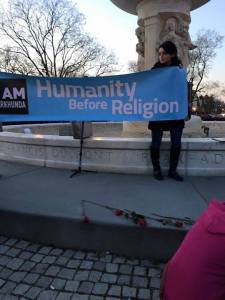19th MARCH 2015: The violent murder of the 27-year old Farkhunda Malikzada led hundreds of people in Afghanistan to go out on the streets, protest for women’s rights and call on the authorities to enforce law and justice. Farkhunda was beaten to death by a crowd of people in front of a mosque witnessed by local police officers, who did nothing to stop the crime. The mullah accused her of burning pages from Quran. Police investigations later revealed that these allegations of Quran desecration were false and she had merely criticised the mullah’spractice of selling charms at the Shah-Do Shamshira Mosque, a religious shrine in Kabul. Afghan diaspora communities in the United States and Europe expressed their solidarity demanding ‘Humanity before Religion’. Their message is clear – punishment must come from courts and an independent jurisdiction, instead of from religion and tradition. 

Zohra Mahmoud Ghazi, herself an Afghan woman living in London, expresses her anger over Fakhunda’s vicious death and her admiration for the many brave women that raised their voices and joined in protest: ‘The burial of Farkhunda was carried out solely by women – an unprecedented practise in Afghanistan showing their anger and revolt against both the perpetrators and the general gender inequality. What I found most disappointing, although the two main leaders [President Ashraf Ghani and CEO Abdullah Abdullah] were in the United States at the time of the incident, that we still have not seen either of them facing the Afghan public at the street level and sharing the public’s pain.
‘The President has ordered a commission to investigate the killing and that is good. However, I would like to see him and Abdullah Abdullah joining the protesters on the street and show their solidarity with the people and genuine understanding of the hurt that many feel about what has happened. The killing has awoken many raw feelings within Afghan women. The government needs to clearly position themselves on the side of the people who call for women’s rights, humanity and a fair justice system. It is important that these voices are heard and their anger is translated into change on a political level.
‘As many Afghans living abroad, I have the luxury to say a lot more than I would be able to if I was still in Afghanistan. However, I believe that it is important not to forget the terrible incident. Fakhunda’s pain should not be in vain. March 19thshould become a day of commemoration, an Afghan women’s day, when people remember not only her death, but also the hardships of women in Afghanistan in general and ways of strengthening their voices and implementing their rights. I want something to change after the killing and the outrage it caused both in Afghanistan and abroad. It should not be brushed under the carpet, but used as a wake up call for action. Strong societies depend on gender equality and women’s empowerment.’
No comments:
Post a Comment